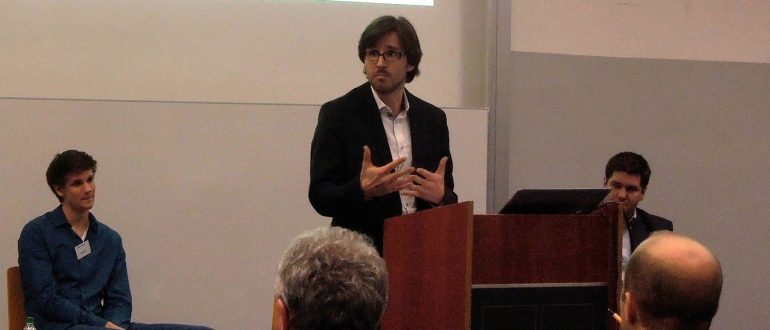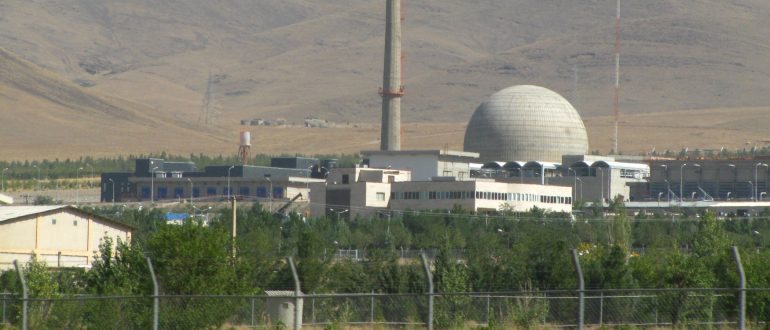Power struggle in the Gulf: An assessment of the Saudi threat perception towards Iran’s nuclear program
This essay examines the threat perception of the Saudi public as well as the ruling elite towards Iran and its nuclear program. The demonstrations in Bahrain and the subsequent intervention of the GCC is hereby seen as a decisive factor of change in the threat assessment.
As a result of the newest IAEA report, released in November last year, sanctions against Iran are to be or have already been implemented. This happened with the silent consent of the Gulf monarchies, that have called for a more staunch approach on the alleged nuclear weapons program of Iran in the past. But why is there such a strong antipathy towards Iran’s nuclear program in the Gulf States? With Saudi Arabia being the unofficial political leader in the GCC, the threat perception among the people as well as the elites will be examined in the following essay.
The United States are and have been worried about the nuclear program on the less friendly side of the Gulf, as the possibility exists that Iran could develop a nuclear weapon in the long-term. But how is this seen in Saudi Arabia, the closest US ally in the region?
1. Public perception and opinions of the ruling elite
The Brookings Arab Public Opinion Poll 2010 suggests that even among those Saudis who believe that Iran does not have peaceful purposes, 50% do argue that the Islamic Republic has the right to pursue a nuclear program (Brookings 2010a, p.49). The figures for the Kingdom 2011 are not publicly available yet, but as the author of the poll stated during an event, particularly the Saudis see Iran as a threat. Half of all Saudis would like to see the nuclear program stopped. (Brookings 2011, p.22).
One can see that public perception has slightly shifted, with now the absolute majority of the people seeing the Iranian nuclear program as a threat.
Much more important however, is the perception of the political elite as they rule the country. Sadly, no Arab Elite Opinion Poll has been released by Brookings yet. Taking into account different remarks by Saudi officials in combination with analytical commentaries are helpful gauging the Saudi threat perception towards the Iranian nuclear program.
All the official Saudi statements in the media can not be taken seriously. This is due to the fact that these assessments are targeted at a specific audience with a certain intent. For example, officials cannot condemn Iran publicly in media widely available to domestic audiences. This stems from the fact that a big proportion of Saudi citizens still have sympathy towards the Iranian nuclear program. A harsh criticism of the former could lead to the perception that the government has turned pro-US on the whole issue, which is a problem for conservative circles in the Kingdom (RAND 2009a, p.68). This view is supported by other experts. Cordesman states that internal stability is the highest security priority, even before Iran (Cordesman 2010, p.39).
Leaked US State Department cables paint an entirely different picture of the Saudi perception. Iran would pose an existential threat to the kingdom, especially its nuclear program, and it had to be stopped, even militarily, stated King Abdullah numerous times in meetings with foreign officials, using graphic metaphors (Black, T. 2010).
But these remarks also have to be put in context. Of course, they were made off the record and among knowledgeable government officials. However, one has to take into account that Saudi Arabia, as the main US ally in the Gulf, also profits from a hawkish US view on Iran. The enmity between the US and Iran is one major factor in the close relations between Saudi Arabia and the United States (RAND 2009b, p.137). A decrease of threat perception on the side of the US could also lead to a decrease in the importance of the Kingdom, which is certainly not in its interest. Therefore, a motivation would exist to exaggerate the threat emanating from (and the progress of) the Iranian nuclear program.
Yet, the unofficial remarks made certainly contain much more valid information than domestic newspaper articles, one should just not mistake them for the literal truth.
The Saudis did and do take the threat very seriously. An internal list of viable policy options for Saudi officials pointed out three possible strategies to address the nuclear threat by Iran. First, the acquisition of its own nuclear weapons. Second, enter a nuclear umbrella by a third country via an alliance. Third, the possibility to promote a nuclear-free Middle East is listed (RAND 2009b, p.69). All of these options have very severe consequences for the Kingdom’s foreign policy as well as international stance. This indicates how serious Saudi Arabia is taking the Iranian nuclear question if an implementation of one of these steps is being considered.
As can be seen, this very delicate topic is being discussed in a very confined circle, partly due to the reasons pointed out earlier, and also because Saudi Arabia does not want to escalate the situation. This, very interestingly, also applies to Iran (Cordesman et al, 2011, p.13).
2. Impact of the Arab Awakening
This stance of the Kingdom has changed over the events of the Arab Uprisings. A rhetorical battle ensued over the GCC’s intervention of Bahrain, with Iran accusing the Kingdom of unacceptable actions which “will further complicate the issue” (Cordesman, A., 2010, p.13). Along the stir of emotions between the countries tensions were further fueled by the alleged plot to assassinate the Saudi ambassador to the United States (Cordesman et al, 2011, p.13). Both of these events probably did increase Saudi fears, but more likely of Iran in general rather than specifically of its nuclear program. However, with the last IAEA report, issued in November 2011, this changed. Iran was, for the first time, directly accused of the development of nuclear weapons capabilities by the IAEA (Borger, J. 2011). This report triggered two developments on the side of Saudi Arabia. First, a cooperation agreement was signed with the government of South Korea with the declared goal of developing a Saudi nuclear program, including the building of power plants (Reuters 2011). This lays the potential groundwork for a domestic nuclear weapons program of the Kingdom, especially if taking into consideration that Saudi Arabia might have intentions of developing its own nuclear weapons capabilities (IBT 2011). On the other hand, Saudi officials publicly warned against a military strike on the Iranian nuclear installations, at the same time endorsing a further tightening of the sanctions (Cordesman et al, 2011, p.14). These actions and comments, together with the already tense atmosphere, indicate a change in the threat perception of the Kingdom towards the Iranian nuclear program. As the taboo of public criticism towards Iran has been broken during the Bahrain crisis, Saudi officials are more openly acknowledging the threat emanating from the nuclear program across the Gulf.
However, if one analyses the actions of the Kingdom, other threats seem more dangerous. During the Arab Awakening, the demonstrations in Bahrain demanding greater participation provoked the Saudi government. A greater participation of the people is seen as an invitation of meddling by Iran, endangering an important ally. This mere possibility was enough to deploy troops and receive heavy criticism from the international community (Riedel, B. 2011). Compared to these actions, the reaction to the recent IAEA report has been rather moderate.
3. Conclusion
So is it realistic to claim that the Kingdom is more concerned about Iranian asymmetric assets rather than the nuclear ones?
Yes, argues Zweiri, in a Brookings debate in 2010. The Gulf states, including Saudi Arabia, would be more concerned with the meddling of Iran on the ground in various countries in the region rather than the possible nuclear weapon. This would be the priority of the United States, and often falsely assumed that it is the same on the Arab peninsula (Brookings 2010b, p.29).
Therefore, it can be said that Saudi Arabia perceives the Iranian nuclear program as a significant threat that has to be countered, although the opinion between the people and the elite is not necessarily identical. However, other threats by Iran are seen as more significant. The possible meddling on the Arab peninsula poses a bigger threat in the eyes of the Saudi government as it undermines the internal stability of the Kingdom and therefore the state in its current form, lead by the Al Saud. A possible Iranian nuclear weapon however, does simply not pose an existential threat to the Kingdom.
by Chrisoph Schenkel
Christoph Schenkel is a graduate student of Political Science at the Ludwigs-Maximilians-Universität in Munich, Germany. This work is based on a paper produced during the Washington Semester Program at American University, Washington DC.
Bibliography:
Brookings Institution 2010a. 2010 Arab Public Opinion Poll: Results of Arab Opinion Survey Conducted June 29-July 20, 2010. [pdf] Available at: <http://www.brookings.edu/~/media/Files/rc/reports/2010/0805_arab_opinion_poll_telhami/0805_arabic_opinion_poll_telhami.pdf> [Accessed 19 March 2012]
Brookings Institution, 2010b. What to do about Iran? American & Gulf Perspectives. [pdf] Available at: <http://www.brookings.edu/~/media/Files/events/2010/0505_iran/0505_iran_transcript.pdf> [Accessed 19 March 2012]
Brookings Institution 2011. The View from the Middle East: The 2011 Arab Public Opinion Poll. [pdf] Available at: http://www.brookings.edu/~/media/Files/events/2011/1121_arab_public_opinion/20111121_arab_public_opinion_transcript.pdf [Accessed 19 March 2012]
Cordesman, A., 2010. Saudi National Security and the Saudi-US Strategic Partnership. Part One: The Civil & Economic Aspects of Security. [pdf] Center for Strategic and International Studies, Washington DC. Available at <http://csis.org//files/publication/100517_SaudiBrief_I_Econ.28.4.10.pdf> [Accessed 19 March 2012]
Cordesman et al., 2011. US and Iranian Strategic Competition in the Gulf States and Yemen. Working Draft. [pdf] Center for Strategic and International Studies, Washington DC. Available at <http://csis.org/files/publication/111121_Iran_Ch5_GulfState.pdf> [Accessed 19 March 2012]
Black, T., 2010. ‘Saudi Arabia urges US attack on Iran to stop nuclear programme.’ The Guardian, [online] 28 November. Available at: <http://www.guardian.co.uk/world/2010/nov/28/us-embassy-cables-saudis-iran> [Accessed 19 March 2012]
Borger, J., 2011. UN watchdog reveals ‘serious concerns’ about Iranian nuclear weapons research. The Guardian [online] 8 November. Available at <http://www.guardian.co.uk/world/2011/nov/08/un-watchdog-iranian-nuclear-weapons?newsfeed=true> [Accessed 19 March 2012]
Tovrov, 2011. Saudi Arabia Mulls Nuclear Weapons Over Iran Threat. International Business Times,[online] 5 December. Available at <http://m.ibtimes.com/saudi-arabia-mulls-nuclear-weapons-iran-threat-262477.html> [Accessed 6 December 2011]
Riedel, B., 2011. Brezhnev in the Hejaz. The National Interest, [online] 24 August. Available at <http://nationalinterest.org/article/brezhnev-the-hejaz-5733> [Accessed 19 March 2012]
Wehrey et al., 2009 (cited as RAND 2009a). Saudi-Iranian Relations since the Fall of Saddam. Rivalry, Cooperation and Implications for US policy. [pdf] RAND Cooperation, Santa Monica. Available at <http://www.rand.org/content/dam/rand/pubs/monographs/2009/RAND_MG840.pdf> [Accessed 19 March 2012]
Wehrey et al., 2009 (cited as RAND 2009b). Dangerous but not omnipotent. Exploring the Reach and Limitations of Iranian Power in the Middle East. [pdf] RAND Cooperation, Santa Monica. Available at <http://www.rand.org/content/dam/rand/pubs/monographs/2009/RAND_MG781.sum.pdf> [Accessed 19 March 2012]
Reuters, 2011. Saudi Arabia, South Korea in nuclear cooperation deal. Reuters, [online], 15 November. Available at <http://www.reuters.com/article/2011/11/15/us-saudi-southkorea-idUSTRE7AE0GU20111115> [Accessed 19 March 2012]



